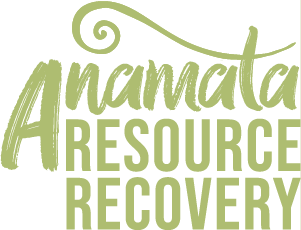Living Lightly Featuring Sue Daly
Introducing a true island pillar and legend. Sue and her family reside in Okupu. She is renowned for her excellent garden, preserves, creative kitchen and resourcefulness.
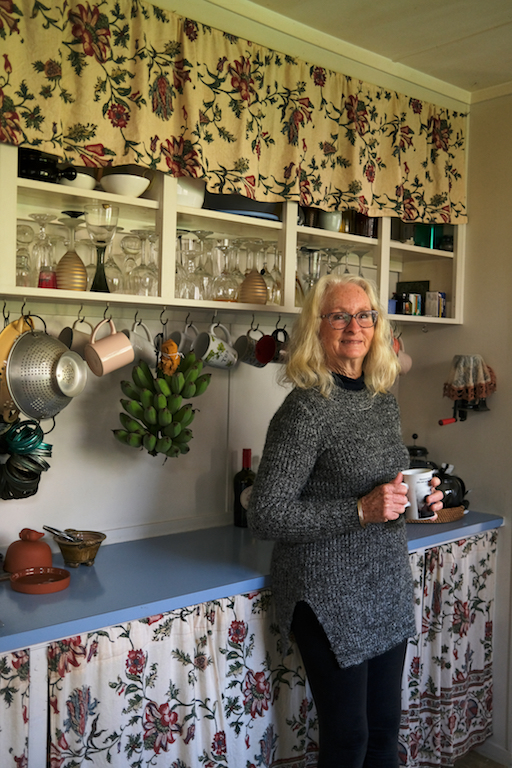
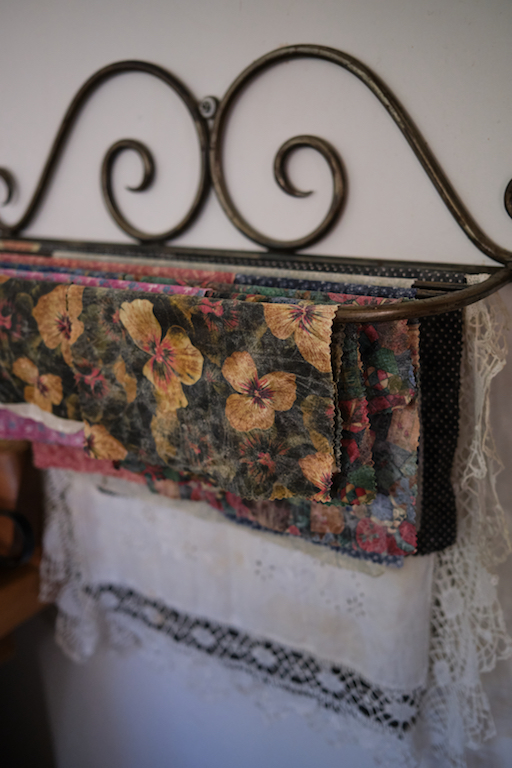
How long have you lived on Aotea?
I have been here full-time since 1973.
Are you originally from the island? If not, how did you end up here?
I am not originally from the island, but I came here first as a kid.
We’ve been in this house since 1977 and have raised five children here. I have deep, strong roots on the island. I’m an Earth Mother, a nester. Only by living, you find out who you are and what your passions are. It’s always felt like my place on Earth.
When and how did your zero / minimum waste journey begin?
Out of necessity, right from the beginning. I didn’t come here with much, financially or materially.
Though really big changes came around 2008 when I did the organic horticulture courses with Caity Endt and we learned about soil. I had gardened for years, but I lost my garden every summer. Once I learned about soil, it’s like the lights went on. Soil changed my life. I think I started to worry about the land at that point and what I was doing to it. I’d always had a compost bin, but then I started to think about regeneration and permaculture. In the course, 4 years of organic horticulture, I was putting all this stuff in and I realised everything organic needed to go back into the soil and I shouldn’t be putting it in the landfill.
Although slow, if you just think about things, you can solve lots of problems. Once I started thinking about soil differently, then I could use everything that was here and everything that came to our house that should go back into it.
You start questioning everything else. It’s a long journey, picking things off, little wins, sometimes you regress, but you try, try again. But it has taken a couple of efforts and that’s okay.
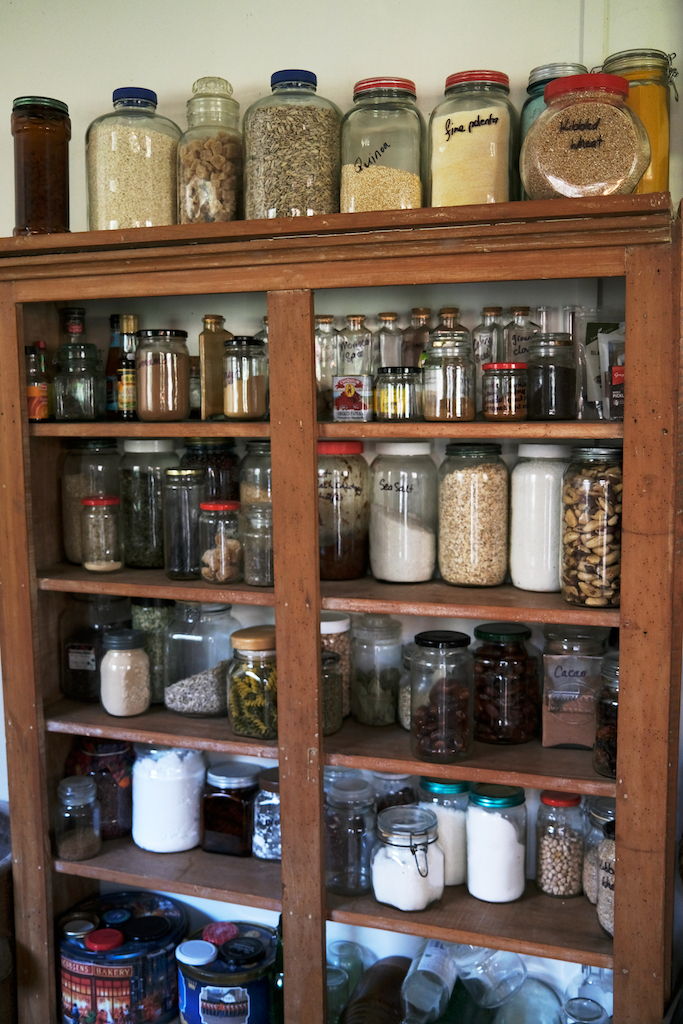
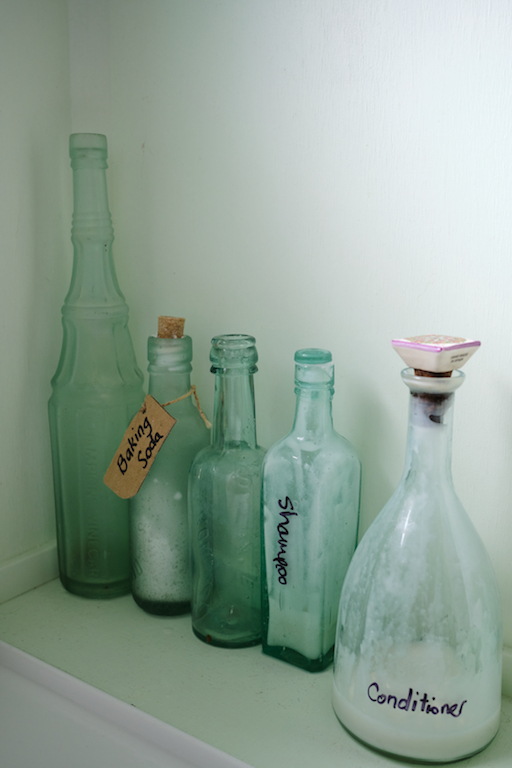
Tell us about some of the things you do that help to reduce waste, resource consumption, and sustainable living.
I have a strict ‘No new synthetic clothes’ rule (but I can still use things at the op shop if they are synthetic). I use a lot of second hand clothing, but any new clothes must be natural fibers – cotton, linen, silk, wool, etc.
We don’t do any online shopping because I can’t bear the packaging and we support local (plus, shopping in person gives you the chance to choose the packaging). Plus, I have the time. No children at home, so I have the time to think more. I support Stonewall, they do as much as they can for us, so I do as much for them.
I am also a CO-OP supporter, which supports the group economy. There is much less packaging and more recycled packaging, plus great quality products. (Inquire to join one!)
The thing is – TO TRY! Just try things, some may be right and may be wrong.
What motivates you about this lifestyle? Why is this important for you, your family and your home?
The connection to nature, life and being this close to the environment. I like having my first thought each day be the weather, watching the sky, seeing the forest and ocean everyday. I need nature and space, I need to feel the Earth under me. The wildlife – birds, fish, going to the beach and having a really good chance of seeing dolphins, fish and other wildlife. Watching the natural world going on around you. I never got tired of driving on these roads – everything is a corner, a view, lush bush. I want to do my part and take care of it.
Food waste is a large contributor to our wastecycle island and country-wide. What is your policy / best practice to minimize food waste? (Including tips for grocery shopping esp. online and how to avoid so much packaging while shopping local, composting, using what you have,etc.)
What waste? It’s all a resource. Nothing organic leaves the property, I use it all. I have chooks to eat scraps, use my many compost bins, etc.
What are some of your best min waste / up-cycling tips?
Patching clothes, mending minor chips in plates and cups. When I am cutting off elastic waist bands that are going in the undies, I keep the elastic to tie up the rubbish bags. Same with ribbons from garments – keep all for tying up. Saving all brass hooks over the years to make new hanging racks.
I look at everything with an eye for a second life. For us? A neighbour? Anamata?
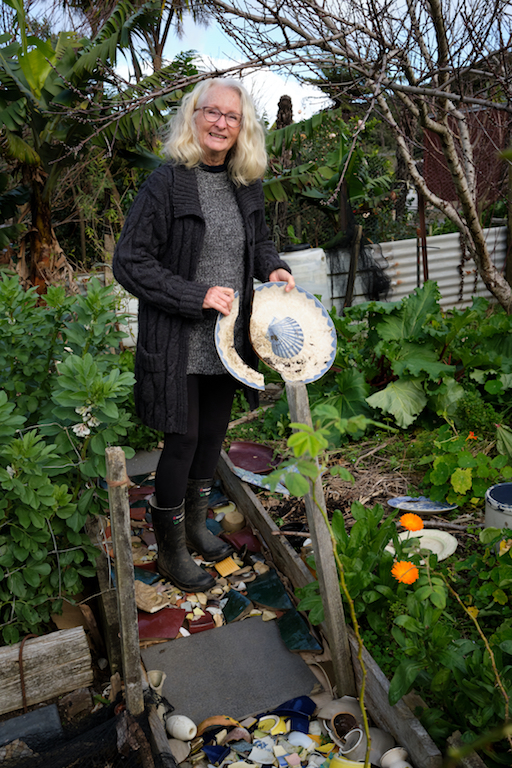
What are you most excited for in regards to the future of min waste on the island?
What most excites me is that we have really got ourselves positioned now to take the whole community where we need to go – not just a few people. People leading, Trusts, Auckland council – we could do great things. We could move a whole community – it’s the scale that needs to happen now. The opportunity that we have, on the island, the sharing – can get a more direct narrative of change.
How do you see the influx of people moving here/visiting? How do we get them up to speed?
We need to be using and implementing our Destination Management Plan. We don’t want crowds of random people, it’s better to get people who are going to get something out of being here and being part of the solution. Implementing a targeted visitor plan, giving them the information when they are here. We need to have houses and holiday homes educated and involved. It’s a finite place, we could actually do this.


How long have you lived on Aotea?
I have been here full-time since 1973.
Are you originally from the island? If not, how did you end up here?
I am not originally from the island, but I came here first as a kid.
We’ve been in this house since 1977 and have raised five children here. I have deep, strong roots on the island. I’m an Earth Mother, a nester. Only by living, you find out who you are and what your passions are. It’s always felt like my place on Earth.
When and how did your zero / minimum waste journey begin?
Out of necessity, right from the beginning. I didn’t come here with much, financially or materially.
Though really big changes came around 2008 when I did the organic horticulture courses with Caity Endt and we learned about soil. I had gardened for years, but I lost my garden every summer. Once I learned about soil, it’s like the lights went on. Soil changed my life. I think I started to worry about the land at that point and what I was doing to it. I’d always had a compost bin, but then I started to think about regeneration and permaculture. In the course, 4 years of organic horticulture, I was putting all this stuff in and I realised everything organic needed to go back into the soil and I shouldn’t be putting it in the landfill.
Although slow, if you just think about things, you can solve lots of problems. Once I started thinking about soil differently, then I could use everything that was here and everything that came to our house that should go back into it.
You start questioning everything else. It’s a long journey, picking things off, little wins, sometimes you regress, but you try, try again. But it has taken a couple of efforts and that’s okay.
Tell us about some of the things you do that help to reduce waste, resource consumption, and sustainable living.
I have a strict ‘No new synthetic clothes’ rule (but I can still use things at the op shop if they are synthetic). I use a lot of second hand clothing, but any new clothes must be natural fibers – cotton, linen, silk, wool, etc.
We don’t do any online shopping because I can’t bear the packaging and we support local (plus, shopping in person gives you the chance to choose the packaging). Plus, I have the time. No children at home, so I have the time to think more. I support Stonewall, they do as much as they can for us, so I do as much for them.
I am also a CO-OP supporter, which supports the group economy. There is much less packaging and more recycled packaging, plus great quality products. (Inquire to join one!)
The thing is – TO TRY! Just try things, some may be right and may be wrong.
What motivates you about this lifestyle? Why is this important for you, your family and your home?
The connection to nature, life and being this close to the environment. I like having my first thought each day be the weather, watching the sky, seeing the forest and ocean everyday. I need nature and space, I need to feel the Earth under me. The wildlife – birds, fish, going to the beach and having a really good chance of seeing dolphins, fish and other wildlife. Watching the natural world going on around you. I never got tired of driving on these roads – everything is a corner, a view, lush bush. I want to do my part and take care of it.
Food waste is a large contributor to our wastecycle island and country-wide. What is your policy / best practice to minimize food waste? (Including tips for grocery shopping esp. online and how to avoid so much packaging while shopping local, composting, using what you have,etc.)
What waste? It’s all a resource. Nothing organic leaves the property, I use it all. I have chooks to eat scraps, use my many compost bins, etc.
What are some of your best min waste / up-cycling tips?
Patching clothes, mending minor chips in plates and cups. When I am cutting off elastic waist bands that are going in the undies, I keep the elastic to tie up the rubbish bags. Same with ribbons from garments – keep all for tying up. Saving all brass hooks over the years to make new hanging racks.
I look at everything with an eye for a second life. For us? A neighbour? Anamata?



What are you most excited for in regards to the future of min waste on the island?
What most excites me is that we have really got ourselves positioned now to take the whole community where we need to go – not just a few people. People leading, Trusts, Auckland council – we could do great things. We could move a whole community – it’s the scale that needs to happen now. The opportunity that we have, on the island, the sharing – can get a more direct narrative of change.
How do you see the influx of people moving here/visiting? How do we get them up to speed?
We need to be using and implementing our Destination Management Plan. We don’t want crowds of random people, it’s better to get people who are going to get something out of being here and being part of the solution. Implementing a targeted visitor plan, giving them the information when they are here. We need to have houses and holiday homes educated and involved. It’s a finite place, we could actually do this.
How can people start to incorporate zero / min waste attitudes and habits into their daily life?
Conscious purchasing. Just thinking. Do things in little bites. Do what you can – shopping where your values align, support local initiatives, voting where it matters for folks who are going to change the system.
Never be a purist, you’d be setting yourself up to fail. It’s an impossible task. It’s just better to be caring, thoughtful, empathetic. Trying to learn to live within boundaries rather than dominate.
What do you hope to see on Aotea over the next 5-10 years?
Sharing the narrative, take the bulk of the community on the journey. Infrastructure embedded and understanding absorbed. Having a clear narrative that we believe and trust in. We can do it here.

